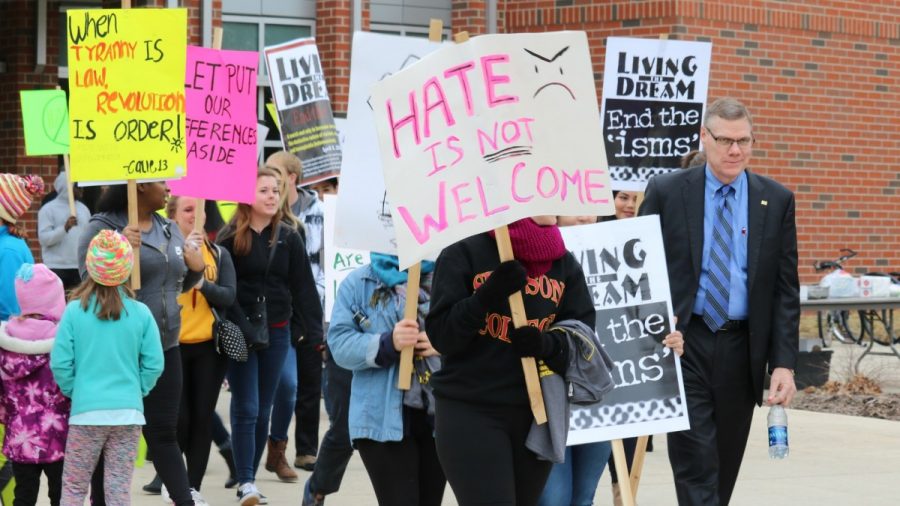#PressForProgress bodes well for Simpson student activists
March 8, 2018
This article was prepared by the Simpsonian’s Jetstream Team, consisting of Alex Kirkpatrick, Emily Carey, Randy Paulson and Austin Hronich. The Simpsonian’s Morgan Frideres contributed.
DES MOINES, Iowa — International Women’s Day has been celebrated since 1914, but this year’s campaign, aptly summarized with the hashtag #PressForChange, could be what some women’s rights advocates are calling a “societal shift.”
Women have endured sexual harassment and income disparity since, well, forever. But the #MeToo and #TimesUp movements have given a voice to the voiceless and power to the downtrodden — and Simpson College’s campus is no exception.
“I do think more conversation started happening when people started feeling threatened,” Student Body President Emma Schlenker said. Before Schlenker, another woman, Sydney Samples, led Simpson’s student body. And before that, Erica Heidler was elected student body vice president.

“#MeToo and #TimesUp have come at a similar time that I’ve noticed the women in my life building me up more,” Schlenker said. “Maybe this is a societal shift. More women are standing in solidarity against things we know are wrong, but we’re also standing together and supporting others in ways to promote what we know is right.”
The student body president pointed to groups that have popped up in the last few years – including the Feminist Club, the Black Student Union and Pride – as being “instigators of this giant cultural movement” to have minorities feel more empowered in the media and in political positions.
Jennifer Nostrala, who’s been teaching women’s and gender studies courses for at least 15 years, said the #MeToo movement has had nationwide implications where people feel more comfortable to report situations regarding sexual harassment without fear of backlash.
“I think the #MeToo movement lit that fire and made it so that people felt it was OK to come forward and that there’s potential for things to change,” Nostrala told The Simpsonian.
Nostrala, a Simpson College alumna, said there wasn’t any discussion about what constitutes sexual harassment when she was a student. As a member of the faculty, however, she’s noticed more women on campus and on staff.
As a division head 15 years ago, Nostrala said she was the only woman around the table, along with the academic dean and five division heads.
“The notion is, if a woman had to play essentially a man’s game in order to get into the leadership position, she didn’t look back at the other women and go, ‘How can I help you?’ because it would have looked as if she was only helping the woman because she was a woman,” Nostrala said.
Most allegations of sexual harassment turn out to be true, she said. But approximately half of women still believe reports are ignored, according to a recently released poll from market research company Ipsos.
“The reality is, it is bad,” Nostrala said. “I think the more that it’s in the public eye, the easier it is to address.”
The activism has inspired current leadership to effect change. “I know I wouldn’t have run for SGA if a female friend of mine didn’t come up to me and say, ‘I think you’d be a great candidate,’” Schlenker said.
The drive to steer more women to run for leadership positions could be due to an effort spearheaded by Simpson College alumna Britney Samuelson.
It’s called the Economic Potential for Iowa Companies, or EPIC, challenge, which called on the institution to become a more inclusive place for female leaders and promote equality in the workplace.
“My big, driving factor was the fact that we don’t have very many women on student government,” Samuelson told The Simpsonian last year.
In fall 2016, eight out of 22 members, or roughly 36 percent, of the SGA were women. But women made up 56.5 percent of students and men made up 43.5 percent, according to the college’s Institutional Data Review. Similarly, as the board of trustees’ page on Simpson’s website shows, 34 of the 43 board members were men.
“I saw this inequality at Simpson and this gender gap on the board of trustees, and I just thought that the EPIC Challenge would be a good way to promote gender equality on our campus,” Samuelson said.
In a resolution passed last fall, the SGA formally asked the administration to sign on to the challenge, which the board of trustees did on Feb. 3, 2017.
A press release from the SGA said the board approved three of the five “areas of improvement” the challenge puts forward. These three areas are: to increase the retention rate of women at all levels; to monitor, discover and address gender-based pay gaps; and to increase the number of women on the college’s board of trustees.
The other two areas of improvement the board did not approve were to actively recruit women for staff and faculty positions and to increase the percentage of women in senior leadership positions.
When asked why the board did not approve the recruitment measure, Samuelson said the administration wanted to focus on hiring those who are most capable and qualified for any vacant positions, regardless of gender.
Since “senior leadership positions” refers to the president’s cabinet, Samuelson said the last provision was unnecessary because President Jay Simmons already has an equal number of men and women in his cabinet.
“It’s very common with the EPIC Corporate Challenge in the first year for organizations to only sign on to one or two different goals and then to maybe increase the goals as they renew their commitment every year,” Samuelson said, adding that Simpson could choose to take off provisions of the challenge it has already taken on as the issues are resolved.
“I think President Simmons is committed to looking at this as long as we need to look at it,” Samuelson said. Already, Simmons’ administration is starting to look at potential gender wage gaps between Simpson employees, she said.
Samuelson said she would like to see more women on the board of trustees. She called the lack of women’s perspective “troublesome,” since the board decides much of what happens on campus.
“I’m hoping that what we’ve done with SGA is going to start to change the culture overall,” she said. “I hope that what we’ve done is we’ve begun conversations about gender equality and about women’s leadership.”
As for Schlenker, she wants to leave Simpson a more progressive campus. “Maybe we’ll have four or five female student body presidents back to back to back, and that’ll seem like the norm,” she said.
Some of her work includes focusing on mental health initiatives. Nearly every two weeks, she said there’s been a sexual assault or mental health forum on campus hosted by SGA, thanks to the work of the internal affairs or student advocacy committee.
Her biggest challenge has been balancing “how much I love Simpson College and the best way to get something done because sometimes I just want to scream and yell and cause a ruckus, but I know now that that’s not the way to do this.”
She feels optimistic, however, for women in the future as they continue to fight for equal rights. “I think seeing more activism from minorities in the community is going to be a positive for campus,” she said.
___
The Simpsonian’s Jetstream Team consists of four reporters and staff members dedicated to in-depth and investigative reporting on Simpson College’s campus and student-related subjects.
If you have a tip, please contact these representatives of Jetstream:
Alex Kirkpatrick, Jetstream Editor
Alex is a senior majoring in multimedia journalism and minoring in French.
Email: [email protected]
Emily Carey, Digital Media Manager
Emily is a junior majoring in multimedia journalism and theater.
Email: [email protected]
Randy Paulson, Senior Staff Reporter
Randy is a junior majoring in multimedia journalism and minoring in Spanish.
Email: [email protected]
Austin Hronich, Director of Photography
Austin is a junior majoring in sports communication.
Email: [email protected]

















